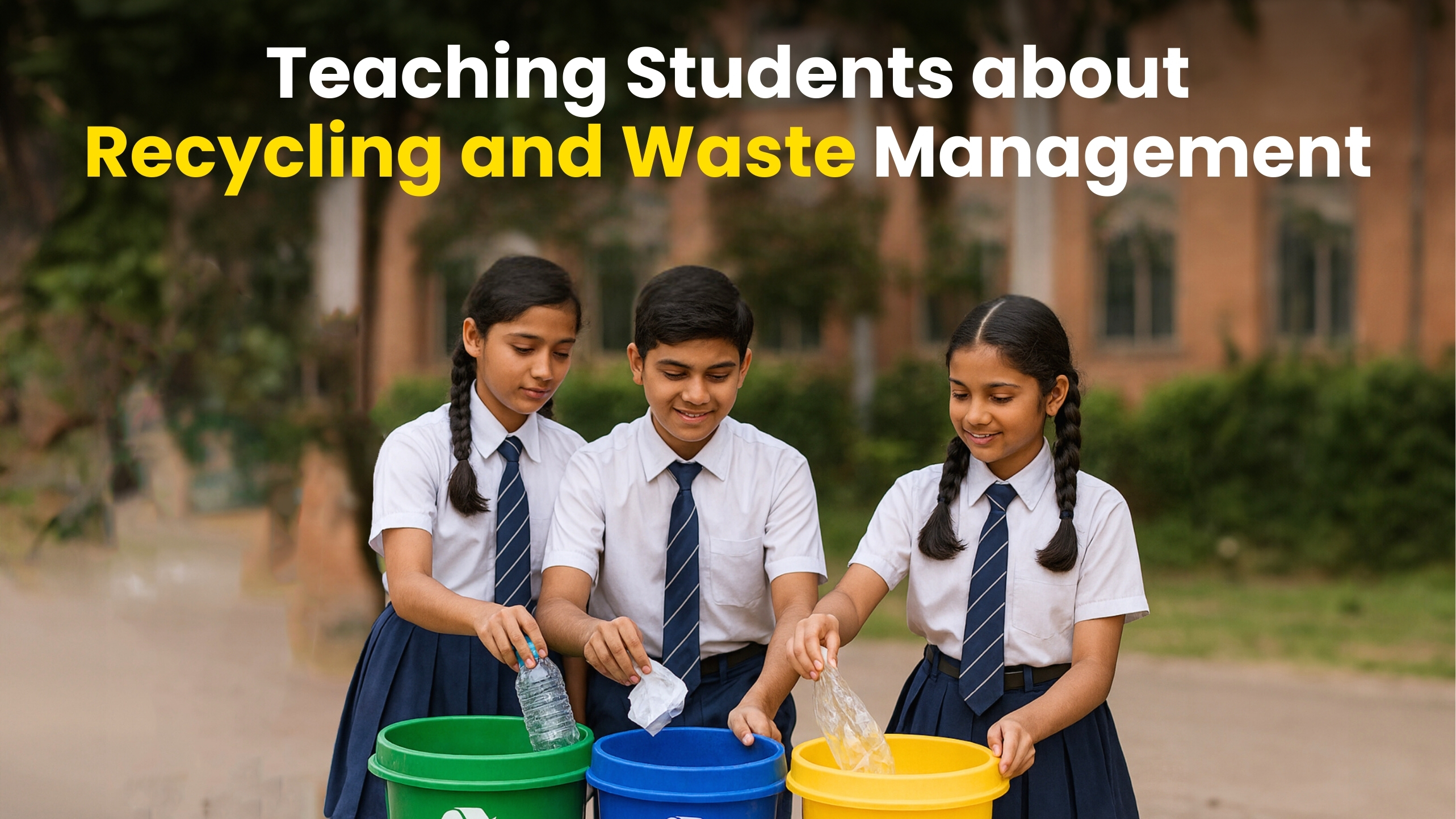
Why Schools Should Teach Waste Management and Recycling
Teaching Students about Recycling and Waste Management
Introduction
In our rapidly growing world, waste management and recycling
are not just conversations; they are actual solutions to many of our problems.
Therefore, it is essential for us to teach it to our students.
Schools have a crucial role to play in shaping the habits,
values, and awareness of future generations. When students learn how to reduce,
reuse, and recycle, they not only help protect the planet but also contribute
to healthier communities, sustainable economies, and better personal life
skills.
In this blog, we will discover why schools should teach
waste management and recycling to their students with its key benefits, and
some of the best practices.
What Students Learn from Schools about Waste Management
Understanding the 3Rs
The 3Rs are Reduce, Reuse, and Recycle. They form the basic
principles. When students are taught how to apply them daily, they develop
consciousness about what they consume and what they throw away.
Reduce: Reducing the use of plastic to save the environment.
Reuse: Buy reusable items for carrying water and food.
Recycle: Recycle items such as paper, cardboard, plastic
bottles and jugs, glass bottles and jars.
Environmental Impact Awareness
Empowering students about how improper waste disposal, such
as plastic bags, use & throw bottles, affects soil, water, air quality,
wildlife, and climate change.
Civic sense
Teaching Civic sense, like not spitting in public, using
public washrooms, not shouting in public, and respectfully talking with
strangers, are some of the things that schools and parents can do to make their
child behave better.
Hands-On Skills & Innovation:
Hands-On Skills, such as turning organic waste into compost,
using waste materials for art projects, or even engaging in recycling drives,
build creativity, practical skills, and problem-solving are also some useful skills
for environmental safety.
Why Waste Management and Recycling Matters: Key Benefits
1. Environmental Benefits
Schools that teach about waste management help increase the
number of trees while reducing the amount of waste going to landfills, reducing
pollution, and conserving natural resources.
2. Health & Hygiene
Decreasing the waste helps in lowering the risk of health
problems, diseases, pests, and contamination—important in dense urban areas.
3. Cost Savings & Efficiency
Schools can cut down on the use of disposable items to reduce
the amount of waste, so when they recycle more, compost organic waste, and
reduce single-use materials. Resources saved can be used for other school
needs.
4. Cultivating Responsible Citizenship
Students become aware citizens who understand their environmental
impact and feel empowered to make positive change, at home, in school, and in
their community.
Best Practices for Integrating Waste Management into School
Curriculum
1. Curriculum Integration
Rather than waste management just being one off-topic add to
the daily activities in books, environmental studies, and life skills.
2. Hands-On Projects & Experiential Learning
Give students projects that are related to environmental
problems so that they can understand that it is actually a big problem that
should be fixed, and give them a follow-up project that also sharpens their
life skills.
3. Infrastructure & Systems
Use clearly labeled bins at schools so that students can
easily understand which things are throwable, which are reusable, and which are
recyclable.
4. Awareness Campaigns & Student Leadership
Create campaigns that create competitiveness between
students over waste management to create a cleaner and more hygienic
environment in the school.
Addressing Common Challenges
1. Behavior Change Takes Time
Many students don’t have the patience to build habits, but
habits don’t change overnight; they take time, repetition, role modeling from
teachers and staff, and making recycling easy so that it won’t feel like a task
and more like a daily habit.
2. Contamination of Recyclables
Educate students and staff about what can/cannot be
recycled. Clear signage helps.
3. Maintenance & Logistics
Keeping compost bins clean, arranging regular pickups of
recyclable waste, disposing of non-recyclables properly-these need consistent
effort.
Conclusion
Teaching waste management and recycling in schools is more
than just an academic exercise; it’s an investment in the future. By helping
students understand the 3Rs (Reduce, Reuse, Recycle), encouraging hands-on
projects, and promoting responsible civic sense, schools prepare young minds to
become environmentally conscious citizens.
The benefits go far beyond the classroom: reducing
pollution, improving hygiene, saving resources, and building a culture of
responsibility. Yes, there are challenges like behavior change and logistics,
but with consistent awareness, supportive infrastructure, and strong school
leadership, these hurdles can be overcome.
When schools integrate waste management into daily lessons
and activities, they are not just teaching a subject; they are shaping a
sustainable mindset that students carry into their homes, communities, and
future workplaces. And, if you want your child to shape these habits, then
contact the best CBSE school in Ghaziabad, known as St. Xavier’s World School.
FAQs
1. What do you mean by waste management?
Ans- Waste management is the methodical process of handling
human-generated waste, from its creation to its final disposal.
2. Why is waste control important?
Ans- Waste control is important because it helps in saving
resources and the environment for future generations.
3. How does waste affect human health?
